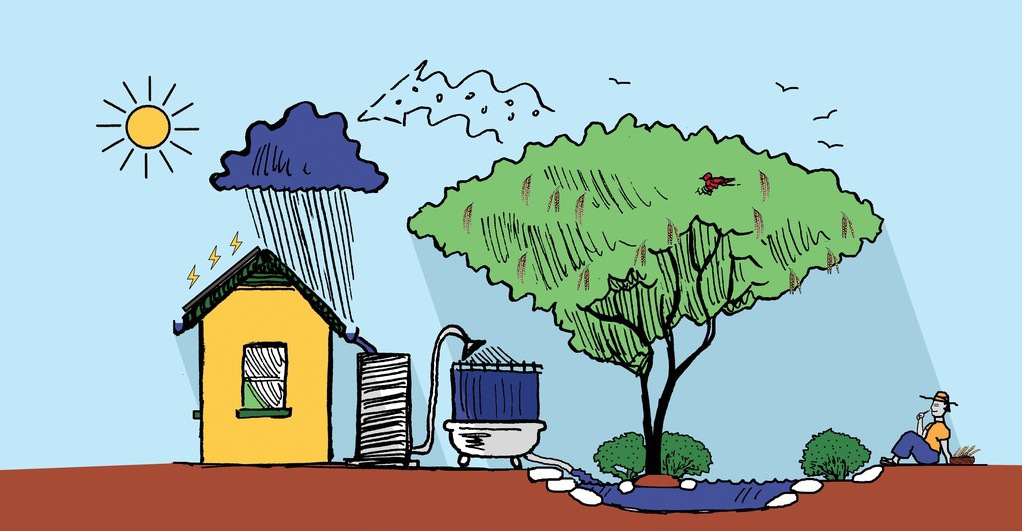
Water Conservation : Rainwater Harvesting
- As the world faces an increasingly critical need to address climate change, the impact that water conservation has on a sustainable environment is undeniable. Groundwater is the primary source of freshwater that caters to the demand of ever-growing domestic, agrarian and industrial sectors of the country. Over the years, it has been observed that the necessity for the exploitation of groundwater resources for various everyday needs, like toileting, bathing, cleaning, agriculture, drinking water, industrial and ever-changing lifestyles with modernization is leading towards tremendous water wastage.
- Though many technological devices are being developed to minimize the water wastage, the impact will be greater if every individual contributes to water conservation by minimizing or optimizing groundwater usage for daily activities. Today, water conservation at individual level has become very critical.
- Our water resources are depleting each year. Additionally, we cannot generate artificial water and must depend on water sources available on our planet earth. Due to population boom and excessive need of water to suit our ever-expanding modern lifestyle, water scarcity is felt all over the world. This has given rise to major concerns over water conservation.
- In this context, adopting rainwater harvesting and recharging groundwater is one of the simplest and best measures in conserving water globally. This practice can efficiently be implemented in lieu of traditional water supplies that are currently on the verge of tapping out.
RAINWATER HARVESTING
- Rainwater harvesting is a simple strategy by which rainfall is gathered and stored for future usage. The process involves collection and storage of rainwater with help of artificially designed systems, that runs off natural or man-made catchment areas e.g.
- rooftop, compounds, rocky surface, hill slopes or artificially repaired impervious/semi-pervious land surface. The collected rainwater from surfaces on which rain falls may be filtered, stored and utilized in different ways or directly used for recharge purposes.
- Rainwater Harvesting is unrestricted from any kind of impurity, with relatively less storage cost and no maintenance cost involved except for periodical cleaning.
- With depleting groundwater levels and fluctuating climate conditions, this measure can go a long way to help mitigate the adverse effects rising water scarcity. Reserving rainwater can help recharge local aquifers, reduce urban flooding and most notably, ensure water availability in water-scarce zones.
Advantages of implementing rain-water harvesting: Reduced Water Bills
- Rainwater harvesting systems are cost-effective, provide high-quality water, lessens dependence on wells and are considerably easy to maintain since they are not utilized for drinking, cooking or other sensitive uses. The all-around expenditures used in setting up harvesting methods are much cheaper compared to other purifying or pumping means. The cost of recharge to the subsurface reservoir is also lower than the surface reservoirs.
Ecological benefit
- Storing water underground is environment-friendly. The ecological benefits of rainwater harvesting are immense. It minimizes the impacts of flooding by funneling the off water into large tanks for recycling and helps reduce the load placed upon drainage systems.
- No land is wasted for storage purpose and no population displacement is implicated therefore, groundwater is not directly exposed to evaporation and pollution. Additionally, it helps minimize the possibility of rivers drying up.
Reduces erosion and flooding around buildings
- It reduces soil erosion and flood hazards by collecting rainwater and reducing the flow of stormwater to prevent urban flooding. Most buildings that utilize rainwater harvesting systems have a built-in catchment area on top of the roof, which has a capacity of collecting large volumes of water in case of rainstorms.
An adequate means for Irrigation purpose
- Harvesting rainwater allows the collection of large amounts of water and mitigates the effects of drought. Most rooftops provide the necessary platform for collecting water. Rainwater is mostly free from harmful chemicals, which makes it suitable for irrigation purposes.
Reduces demand on Ground Water
- Another vital benefit is that it increases the productivity of aquifer resulting in the rise of groundwater levels and reduces the need for potable water. It is extremely essential, particularly in areas with low water levels.
ALL CONTACTS
- Office No - 01204253261
- Phone No - 8700413845
- http://parivarsociety.org/
How To Save Water
1 - How to save water at Home
2 - Water Scarcity in India
3 - Water Conservation : Rainwater Harvesting
4 - Modern Ways Of Water Conservation
5 - Small Ways of Water Saving
- Made by Paniparivaar - Copyright 2021

